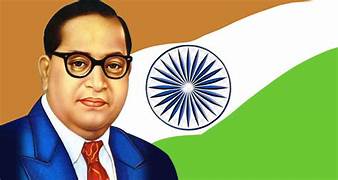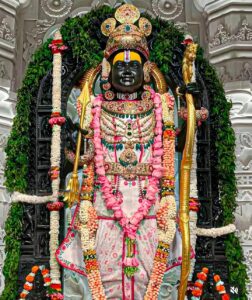About Ambedkar Jayanti.
Ambedkar Jayanti is a significant observance in India, commemorating the birth anniversary of Dr. Bhimrao Ramji Ambedkar, one of the most influential figures in Indian history. Born on April 14, 1891, in the town of Mhow in present-day Madhya Pradesh, Dr. Ambedkar’s life and legacy continue to inspire generations. This comprehensive discourse explores his profound impact on Indian society, spanning his early life, education, contributions to social reform, role in nation-building, and enduring legacy in contemporary India.
Early Life and Education:
Dr. B.R. Ambedkar was born into a Dalit family, formerly known as “untouchables,” who faced severe discrimination and social exclusion in Indian society. Despite facing immense adversity, young Bhimrao showed exceptional academic prowess and a thirst for knowledge. His father, Ramji Maloji Sakpal, served in the British Indian Army, which provided the family with some stability.
Despite facing discrimination, Ambedkar managed to complete his early education in Satara, Maharashtra. His intellectual brilliance earned him scholarships, enabling him to pursue higher studies at prestigious institutions in India and abroad. He obtained a degree in economics and political science from Bombay University and later pursued postgraduate studies at Columbia University in New York and the London School of Economics.
Role in Social Reform:
Throughout his life, Dr. Ambedkar tirelessly fought against the caste-based discrimination and social injustices prevalent in Indian society. He emerged as a prominent leader of the Dalit community, advocating for their rights and dignity. Ambedkar’s seminal work, “Annihilation of Caste,” critically analyzed the hierarchical caste system and called for its abolition.
As the chairman of the Drafting Committee of the Indian Constitution, Ambedkar played a pivotal role in shaping the foundational document of independent India. He championed the principles of liberty, equality, and fraternity, ensuring that the Constitution enshrined fundamental rights and safeguards against discrimination based on caste, religion, gender, or creed.
Political Career and Advocacy:
Dr. Ambedkar’s political career was marked by his unwavering commitment to social justice and empowerment of marginalized communities. He founded the Independent Labour Party in 1936, advocating for the rights of workers and Dalits. Later, he established the Scheduled Castes Federation to provide a political platform for Dalits.
Ambedkar’s tireless advocacy led to significant legislative reforms, including the Hindu Code Bills aimed at modernizing and reforming Hindu personal laws to enhance gender equality and abolish discriminatory practices. His efforts also led to the establishment of the Reserve Bank of India (RBI) and the Finance Commission.
Legacy and Impact:
Dr. Bhimrao Ambedkar’s legacy extends far beyond his lifetime. He is revered as the “Father of the Indian Constitution” for his pivotal role in its drafting and adoption. His vision of a just and egalitarian society continues to guide India’s democratic ethos and legal framework.
Ambedkar’s teachings on social justice, equality, and human rights resonate globally, inspiring movements for social reform and empowerment. His emphasis on education as a means of empowerment continues to influence policies aimed at bridging social and economic disparities.
Ambedkar’s statues and memorials dot the Indian landscape, serving as reminders of his enduring legacy and the ongoing struggle for equality and justice. His birthday, April 14th, is celebrated as Ambedkar Jayanti across India, with tributes, seminars, and cultural events honoring his contributions to nation-building and social reform.
Conclusion:
Dr. Bhimrao Ramji Ambedkar’s life and work exemplify the power of resilience, intellect, and moral courage in the face of adversity. From humble beginnings, he rose to become a towering figure in Indian history, leaving an indelible mark on the nation’s social, political, and constitutional landscape.
Ambedkar Jayanti serves as a moment of reflection and celebration, commemorating the enduring legacy of a visionary leader who dedicated his life to the pursuit of justice, equality, and human dignity. As India continues its journey toward a more inclusive and equitable society, Dr. Ambedkar’s ideals and principles remain as relevant and inspiring as ever.
Why we celebrate Ambedkar Jayanti?
Ambedkar Jayanti is celebrated to honor the birth anniversary of Dr. Bhimrao Ramji Ambedkar, a renowned social reformer, jurist, and the chief architect of the Indian Constitution. The significance of this day lies in recognizing and commemorating the invaluable contributions of Dr. Ambedkar to Indian society. Here are several reasons why we celebrate Ambedkar Jayanti:
- Architect of the Indian Constitution: Dr. Ambedkar played a pivotal role in drafting the Constitution of India. His vision and efforts ensured that the Constitution enshrined principles of democracy, equality, social justice, and fundamental rights. Celebrating his birth anniversary is a way to honor his role in shaping the foundational document of independent India.
- Fight against Caste Discrimination: Throughout his life, Dr. Ambedkar fought against the oppressive caste system and advocated for the rights and dignity of Dalits and other marginalized communities. Ambedkar Jayanti serves as a reminder of his relentless struggle against caste-based discrimination and his commitment to social reform.
- Champion of Social Justice: Dr. Ambedkar dedicated his life to the pursuit of social justice and equality. He advocated for the upliftment of the oppressed and marginalized sections of society through education, legal reforms, and political empowerment. Celebrating Ambedkar Jayanti is a way to honor his lifelong commitment to social justice.
- Symbol of Empowerment: Dr. Ambedkar’s life story, from being born into a marginalized community to becoming a prominent leader and scholar, serves as a source of inspiration for millions. His emphasis on education as a means of empowerment continues to resonate, particularly among Dalits and other disadvantaged groups. Ambedkar Jayanti celebrates his journey and serves as a symbol of hope and empowerment.
- National Integration: Dr. Ambedkar’s ideals of equality, fraternity, and unity resonate across diverse communities in India. Celebrating his birth anniversary promotes national integration and reinforces the values of inclusivity and diversity.
Overall, Ambedkar Jayanti is a day to pay homage to Dr. Bhimrao Ramji Ambedkar’s extraordinary life, his tireless efforts toward social reform, and his enduring legacy as a champion of justice, equality, and human rights.
In Hindi
अंबेडकर जयंती भारत में एक महत्वपूर्ण उत्सव है, जो भारतीय इतिहास में सबसे प्रभावशाली शख्सियतों में से एक डॉ. भीमराव रामजी अंबेडकर की जयंती की याद में मनाया जाता है। 14 अप्रैल, 1891 को वर्तमान मध्य प्रदेश के महू शहर में जन्मे डॉ. अंबेडकर का जीवन और विरासत पीढ़ियों को प्रेरित करती रहती है। यह व्यापक प्रवचन उनके प्रारंभिक जीवन, शिक्षा, सामाजिक सुधार में योगदान, राष्ट्र निर्माण में भूमिका और समकालीन भारत में स्थायी विरासत तक फैले भारतीय समाज पर उनके गहरे प्रभाव की पड़ताल करता है।
प्रारंभिक जीवन और शिक्षा:
डॉ. बी.आर. अम्बेडकर का जन्म एक दलित परिवार में हुआ था, जिसे पहले “अछूत” के रूप में जाना जाता था, जिन्हें भारतीय समाज में गंभीर भेदभाव और सामाजिक बहिष्कार का सामना करना पड़ा था। भारी प्रतिकूल परिस्थितियों का सामना करने के बावजूद, युवा भीमराव ने असाधारण शैक्षणिक कौशल और ज्ञान की प्यास दिखाई। उनके पिता, रामजी मालोजी सकपाल, ब्रिटिश भारतीय सेना में कार्यरत थे, जिससे परिवार को कुछ स्थिरता मिली।
भेदभाव का सामना करने के बावजूद, अम्बेडकर अपनी प्रारंभिक शिक्षा सतारा, महाराष्ट्र में पूरी करने में सफल रहे। उनकी बौद्धिक प्रतिभा ने उन्हें छात्रवृत्तियाँ दिलाईं, जिससे वे भारत और विदेशों में प्रतिष्ठित संस्थानों में उच्च अध्ययन करने में सक्षम हुए। उन्होंने बॉम्बे विश्वविद्यालय से अर्थशास्त्र और राजनीति विज्ञान में डिग्री प्राप्त की और बाद में न्यूयॉर्क में कोलंबिया विश्वविद्यालय और लंदन स्कूल ऑफ इकोनॉमिक्स में स्नातकोत्तर की पढ़ाई की।
सामाजिक सुधार में भूमिका:
अपने पूरे जीवन में, डॉ. अम्बेडकर ने भारतीय समाज में प्रचलित जाति-आधारित भेदभाव और सामाजिक अन्याय के खिलाफ अथक संघर्ष किया। वह दलित समुदाय के अधिकारों और सम्मान की वकालत करने वाले एक प्रमुख नेता के रूप में उभरे। अम्बेडकर के मौलिक कार्य, “जाति का विनाश” ने पदानुक्रमित जाति व्यवस्था का आलोचनात्मक विश्लेषण किया और इसके उन्मूलन का आह्वान किया।
भारतीय संविधान की मसौदा समिति के अध्यक्ष के रूप में, अम्बेडकर ने स्वतंत्र भारत के मूलभूत दस्तावेज़ को आकार देने में महत्वपूर्ण भूमिका निभाई। उन्होंने स्वतंत्रता, समानता और भाईचारे के सिद्धांतों का समर्थन किया, यह सुनिश्चित करते हुए कि संविधान में जाति, धर्म, लिंग या पंथ के आधार पर भेदभाव के खिलाफ मौलिक अधिकार और सुरक्षा उपाय शामिल हैं।
राजनीतिक करियर और वकालत:
डॉ. अम्बेडकर के राजनीतिक करियर को सामाजिक न्याय और हाशिए पर रहने वाले समुदायों के सशक्तिकरण के प्रति उनकी अटूट प्रतिबद्धता द्वारा चिह्नित किया गया था। उन्होंने श्रमिकों और दलितों के अधिकारों की वकालत करते हुए 1936 में इंडिपेंडेंट लेबर पार्टी की स्थापना की। बाद में, उन्होंने दलितों को राजनीतिक मंच प्रदान करने के लिए अनुसूचित जाति महासंघ की स्थापना की।
अम्बेडकर की अथक वकालत के कारण महत्वपूर्ण विधायी सुधार हुए, जिनमें हिंदू कोड बिल भी शामिल था, जिसका उद्देश्य लैंगिक समानता को बढ़ाने और भेदभावपूर्ण प्रथाओं को खत्म करने के लिए हिंदू व्यक्तिगत कानूनों का आधुनिकीकरण और सुधार करना था। उनके प्रयासों से भारतीय रिज़र्व बैंक (RBI) और वित्त आयोग की स्थापना भी हुई।
विरासत और प्रभाव:
डॉ. भीमराव अंबेडकर की विरासत उनके जीवनकाल से कहीं आगे तक फैली हुई है। इसके प्रारूपण और अपनाने में महत्वपूर्ण भूमिका के लिए उन्हें “भारतीय संविधान के जनक” के रूप में सम्मानित किया जाता है। एक न्यायपूर्ण और समतावादी समाज का उनका दृष्टिकोण भारत के लोकतांत्रिक लोकाचार और कानूनी ढांचे का मार्गदर्शन करता रहता है।
सामाजिक न्याय, समानता और मानवाधिकारों पर अम्बेडकर की शिक्षाएँ विश्व स्तर पर गूंजती हैं, जो सामाजिक सुधार और सशक्तिकरण के लिए प्रेरणादायक आंदोलन हैं। सशक्तिकरण के साधन के रूप में शिक्षा पर उनका जोर सामाजिक और आर्थिक असमानताओं को पाटने के उद्देश्य से नीतियों को प्रभावित करना जारी रखता है।
अम्बेडकर की मूर्तियाँ और स्मारक भारतीय परिदृश्य में फैले हुए हैं, जो उनकी स्थायी विरासत और समानता और न्याय के लिए चल रहे संघर्ष की याद दिलाते हैं। उनका जन्मदिन, 14 अप्रैल, पूरे भारत में अंबेडकर जयंती के रूप में मनाया जाता है, जिसमें राष्ट्र-निर्माण और सामाजिक सुधार में उनके योगदान का सम्मान करते हुए श्रद्धांजलि, सेमिनार और सांस्कृतिक कार्यक्रम आयोजित किए जाते हैं।
निष्कर्ष:
डॉ. भीमराव रामजी अंबेडकर का जीवन और कार्य विपरीत परिस्थितियों में लचीलेपन, बुद्धि और नैतिक साहस की शक्ति का उदाहरण है। साधारण शुरुआत से, वह भारतीय इतिहास में एक महान व्यक्ति बन गए, और देश के सामाजिक, राजनीतिक और संवैधानिक परिदृश्य पर एक अमिट छाप छोड़ी।
अंबेडकर जयंती एक दूरदर्शी नेता की स्थायी विरासत को याद करते हुए, चिंतन और उत्सव के क्षण के रूप में कार्य करती है, जिन्होंने अपना जीवन न्याय, समानता और मानवीय गरिमा की खोज के लिए समर्पित कर दिया। जैसे-जैसे भारत अधिक समावेशी और न्यायसंगत समाज की ओर अपनी यात्रा जारी रख रहा है, डॉ. अंबेडकर के आदर्श और सिद्धांत हमेशा की तरह प्रासंगिक और प्रेरणादायक बने हुए हैं।
अंबेडकर जयंती प्रसिद्ध
अंबेडकर जयंती प्रसिद्ध समाज सुधारक, न्यायविद् और भारतीय संविधान के मुख्य वास्तुकार डॉ. भीमराव रामजी अंबेडकर की जयंती के सम्मान में मनाई जाती है। इस दिन का महत्व भारतीय समाज में डॉ. अम्बेडकर के अमूल्य योगदान को पहचानने और स्मरण करने में निहित है। हम अंबेडकर जयंती क्यों मनाते हैं इसके कई कारण यहां दिए गए हैं:
- भारतीय संविधान के वास्तुकार: डॉ. अम्बेडकर ने भारत के संविधान का मसौदा तैयार करने में महत्वपूर्ण भूमिका निभाई। उनकी दूरदर्शिता और प्रयासों ने यह सुनिश्चित किया कि संविधान में लोकतंत्र, समानता, सामाजिक न्याय और मौलिक अधिकारों के सिद्धांत निहित हों। उनकी जयंती मनाना स्वतंत्र भारत के मूलभूत दस्तावेज़ को आकार देने में उनकी भूमिका का सम्मान करने का एक तरीका है।
- जातिगत भेदभाव के खिलाफ लड़ाई: अपने पूरे जीवन में, डॉ. अंबेडकर ने दमनकारी जाति व्यवस्था के खिलाफ लड़ाई लड़ी और दलितों और अन्य हाशिए पर रहने वाले समुदायों के अधिकारों और सम्मान की वकालत की। अम्बेडकर जयंती जाति-आधारित भेदभाव के खिलाफ उनके अथक संघर्ष और सामाजिक सुधार के प्रति उनकी प्रतिबद्धता की याद दिलाती है।
- सामाजिक न्याय के चैंपियन: डॉ. अम्बेडकर ने अपना जीवन सामाजिक न्याय और समानता की खोज के लिए समर्पित कर दिया। उन्होंने शिक्षा, कानूनी सुधार और राजनीतिक सशक्तिकरण के माध्यम से समाज के उत्पीड़ित और हाशिए पर मौजूद वर्गों के उत्थान की वकालत की। अंबेडकर जयंती मनाना सामाजिक न्याय के प्रति उनकी आजीवन प्रतिबद्धता का सम्मान करने का एक तरीका है।
- सशक्तीकरण का प्रतीक: एक हाशिए के समुदाय में जन्म लेने से लेकर एक प्रमुख नेता और विद्वान बनने तक डॉ. अंबेडकर की जीवन कहानी लाखों लोगों के लिए प्रेरणा स्रोत के रूप में काम करती है। सशक्तिकरण के साधन के रूप में शिक्षा पर उनका जोर, विशेषकर दलितों और अन्य वंचित समूहों के बीच गूंजता रहता है। अम्बेडकर जयंती उनकी यात्रा का जश्न मनाती है और आशा और सशक्तिकरण के प्रतीक के रूप में कार्य करती है।
- राष्ट्रीय एकता: डॉ. अम्बेडकर के समानता, बंधुत्व और एकता के आदर्श भारत के विभिन्न समुदायों में गूंजते हैं। उनकी जयंती मनाने से राष्ट्रीय एकता को बढ़ावा मिलता है और समावेशिता और विविधता के मूल्यों को बल मिलता है।
कुल मिलाकर, अम्बेडकर जयंती डॉ. भीमराव रामजी अम्बेडकर के असाधारण जीवन, सामाजिक सुधार के प्रति उनके अथक प्रयासों और न्याय, समानता और मानवाधिकारों के चैंपियन के रूप में उनकी स्थायी विरासत को श्रद्धांजलि देने का दिन है।

















I learned a lot from this article. Keep up the great work!